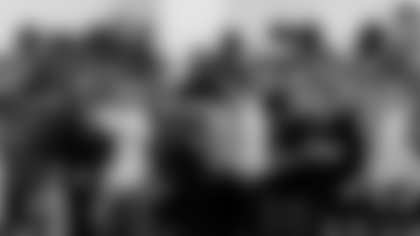The 1981 NFL Draft was rich in talent at the linebacker position. So much so that four linebackers went in the first nine picks. One of them, however, was not Class of 2010 enshrinee Rickey Jackson out of the University of Pittsburgh.
Jackson earned the childhood nickname "City Champ" because of his clutch performances in an array of different sports. He was an all-state pick three times in football and twice in basketball at Pahokee (FL) High School. He also managed to letter in baseball and track. Pahokee was a relatively impoverished school district and so when the high school's camera broke down early in Jackson's senior season, there was no funding to replace it. As such, film of Jackson's play on the football field could not be sent to major colleges around the country. But Jackson did not go undiscovered. His coach drove to Miami to pitch his star player at a coaches convention. Jackson's athletic talent landed him a chance to play for Pitt, the defending national champions, where he starred as a defensive end.
Although Jackson's teammate Hugh Green received much of the publicity, it was Rickey who led the Panthers in tackles during his senior year, a season in which Pitt had the highest rated defense in the country. He led the way with 137 tackles and also had 12 sacks and capped the year with 14 tackles in a 37-9 victory in the Gator Bowl. He then played in the Senior Bowl and earned Defensive MVP honors in the East-West Shrine Game. Needless to say, reports leading up to the '81 draft indicated that Jackson, scouted as an outside linebacker, was projected to go in the first round.
Yet, when the opening round ended after two hours, 53 minutes, Rickey's phone had not yet rung. After the Saints used the first overall draft pick on Heisman Trophy winning running back George Rogers, the New York Giants grabbed the first linebacker of the day. They selected future Hall of Famer Lawrence Taylor with the second overall pick. The St. Louis Cardinals picked the next linebacker at No. 5 when they drafted E.J. Junior. Green went to the Tampa Bay Buccaneers two picks later. Another linebacker came off the board with the ninth pick when the Los Angeles Rams drafted Mel Owens out of Michigan.
The long wait intensified as the draft moved into Round 2. The Saints with their first pick in the second round opted for Nebraska defensive back Russell Gary. Three more linebackers were picked before the Saints would have another chance at getting Jackson. The Chicago Bears nabbed future Hall of Famer Mike Singletary with the 10th pick of the second round. Five picks after that the Rams drafted Syracuse linebacker Jim Collins. Then Minnesota drafted Texas Linebacker Robin Sendlein with the 17th pick of the second round.
Finally, with the 23rd selection of the round (51st overall), the Saints chose Jackson by using a pick acquired through a trade with the San Diego Chargers for running back Chuck Muncie.
"We had him rated a lot higher and were really excited to get him that late," stated Saints head coach Bum Phillips.
The Saints probably weren't fully aware what a bargain they got late in the second round. But, it didn't take long for the team to realize they had drafted a special kind of player.
"I always approached the game the same way – to win," Jackson once shared in an interview following his playing days.
Before he could win, he had to help rebuild what was regarded as one of the league's most down-trodden franchises. Jackson wasted no time in making his mark in the NFL and made the very most of being drafted by a club that finished 1-15 the prior season. The '81 Saints featured 15 rookies and by mid-season six of them were starters. That included Jackson who started every game for New Orleans his first year. He almost instantly became one of the key ingredients of an ever-improving Saints team. Jackson finished third in tackles while also using his speed, quickness, and toughness to lead New Orleans with a rookie team-record eight sacks. He followed that season's performance with another solid outing during the strike-shortened 1982 season. In 1983, the full impact of his talent was demonstrated as he racked up 12 sacks and earned his first Pro Bowl trip.
It was no coincidence that as Jackson continued to develop into one of the game's finest linebackers, the Saints' fortunes turned upward. He was a leader of the New Orleans defensive unit that helped pave the way to the franchise's first winning season, first division title, and first playoff appearance. Perhaps no better evidence of Jackson's impact on the Saints, who for a long time had been perennial losers, is that New Orleans did not finish below. 500 in any of the final seven seasons Jackson wore a Saints uniform.
Fierle is the Manager-Digital Media/Communications at the Pro Football Hall of Fame. He joined the Hall of Fame's staff in 1988.*













